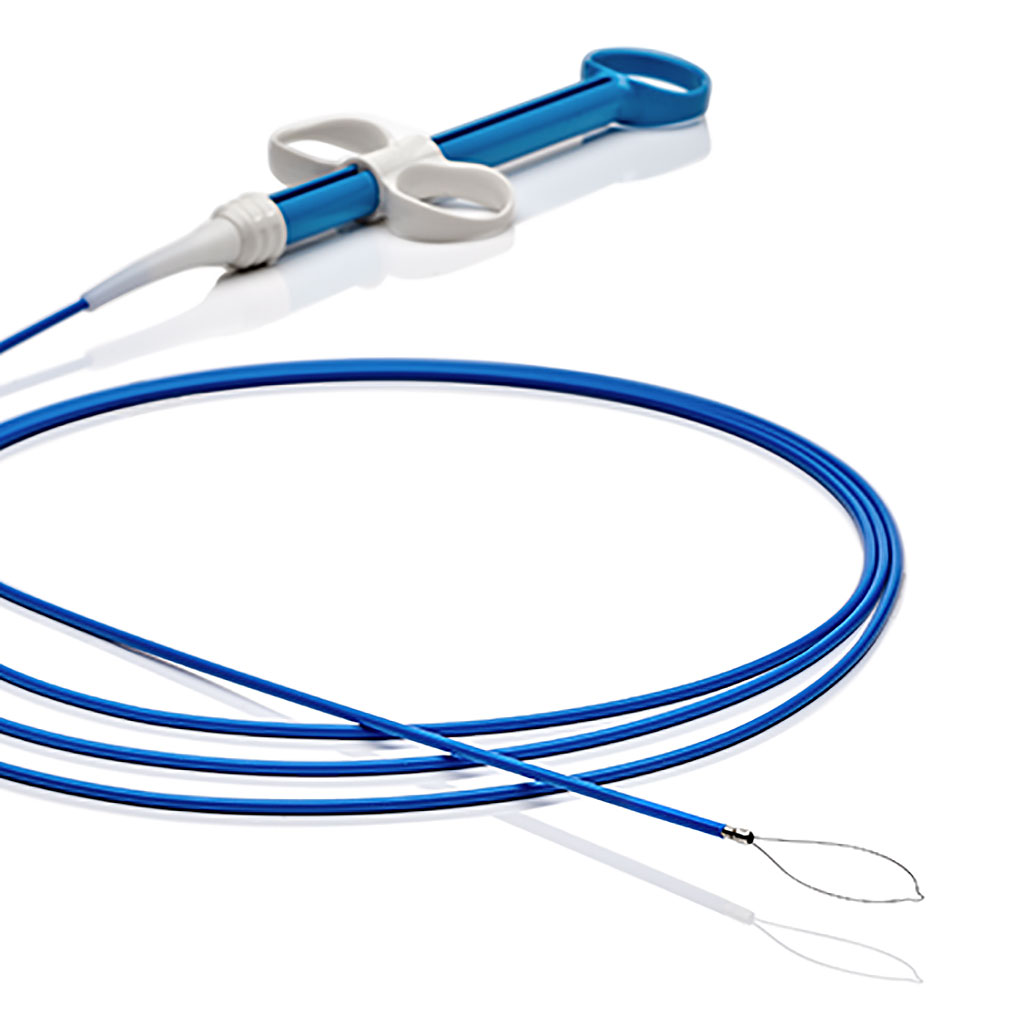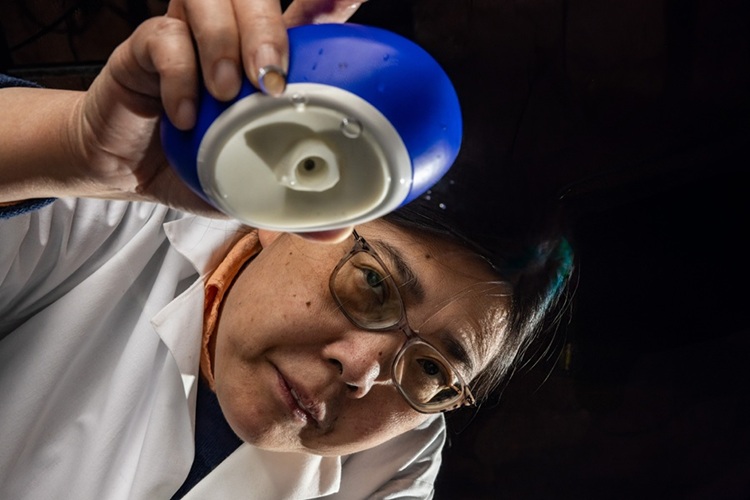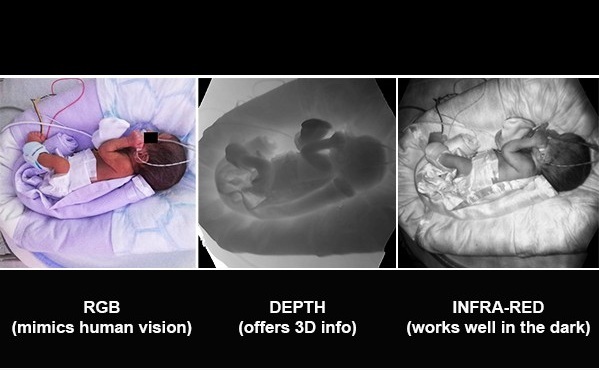Thin Wire Resector Advances Cold Snare Polypectomy
|
By HospiMedica International staff writers Posted on 30 Nov 2021 |

Image: The LesionHunter cold snare, with an ultra-thin Nitinol wire (Photo courtesy of Micro-Tech Endoscopy)
A novel cold snare features a rotatable thin Nitinol wire which provides clean, precise resection of diminutive polyps.
The Micro-Tech Endoscopy (Ann Arbor, MI, USA) LesionHunter is a thin (0.18 mm) Nitinol cold snare specifically designed for resecting sessile polyps, pedunculated polyps, and tissue from within the gastrointestinal (GI) tract. The thin cutting wire provides for a guillotine-type cut, while the loop shape assists in capturing smaller polyps. The coiled metal catheter is stiff in order to aid insertion through an extended scope position, while providing support during resection. A three-ring comfortable grip with shortened throw aids effortless cuts.
The thin wire may also reduce the risk of generating a “fly-away” specimen, thereby making it easier to find the tissue at the end of the resection, and reducing the risk of it being hidden at the back of colon folds. LesionHunter is available in oval 10 mm, 15 mm, and 20 mm widths, with all three having the same 230 cm length and 2.3 mm outer diameter.
“The LesionHunter nitinol wire is 61% thinner than traditional braided snare wires and 42% thinner than the most popular braided cold snare on the market,” said Scott Haack, global R&D director at Micro-Tech. “The thin Nitinol wire allows for multiple tissue resections while maintaining its shape along with the ability to make a clean cut through large pieces of tissue. Current dedicated cold snares and hybrid hot/cold snares can't consistently accomplish this.”
“The LesionHunter is a unique cold snare with two great features, the ability to trap the tissue regardless of how flat the lesion is, and the 'cheese cutter' capability to resect even larger lesions,” said gastroenterologist Gregory Haber, MD, of NYU Langone (NY, USA). “It has become my go-to for cold snare applications.”
Cold snares are emerging as the dominant strategy for excising diminutive polyps in the 4–10-mm range. Pedunculated polyps can also be resected using dedicated cold snare polypectomy, if the snare is large enough to reach the stalk below the polyp head. If submucosal tissue is entrapped in the snare, the captured tissue can be guillotined repeatedly to remove the polyp completely.
Related Links:
Micro-Tech Endoscopy
The Micro-Tech Endoscopy (Ann Arbor, MI, USA) LesionHunter is a thin (0.18 mm) Nitinol cold snare specifically designed for resecting sessile polyps, pedunculated polyps, and tissue from within the gastrointestinal (GI) tract. The thin cutting wire provides for a guillotine-type cut, while the loop shape assists in capturing smaller polyps. The coiled metal catheter is stiff in order to aid insertion through an extended scope position, while providing support during resection. A three-ring comfortable grip with shortened throw aids effortless cuts.
The thin wire may also reduce the risk of generating a “fly-away” specimen, thereby making it easier to find the tissue at the end of the resection, and reducing the risk of it being hidden at the back of colon folds. LesionHunter is available in oval 10 mm, 15 mm, and 20 mm widths, with all three having the same 230 cm length and 2.3 mm outer diameter.
“The LesionHunter nitinol wire is 61% thinner than traditional braided snare wires and 42% thinner than the most popular braided cold snare on the market,” said Scott Haack, global R&D director at Micro-Tech. “The thin Nitinol wire allows for multiple tissue resections while maintaining its shape along with the ability to make a clean cut through large pieces of tissue. Current dedicated cold snares and hybrid hot/cold snares can't consistently accomplish this.”
“The LesionHunter is a unique cold snare with two great features, the ability to trap the tissue regardless of how flat the lesion is, and the 'cheese cutter' capability to resect even larger lesions,” said gastroenterologist Gregory Haber, MD, of NYU Langone (NY, USA). “It has become my go-to for cold snare applications.”
Cold snares are emerging as the dominant strategy for excising diminutive polyps in the 4–10-mm range. Pedunculated polyps can also be resected using dedicated cold snare polypectomy, if the snare is large enough to reach the stalk below the polyp head. If submucosal tissue is entrapped in the snare, the captured tissue can be guillotined repeatedly to remove the polyp completely.
Related Links:
Micro-Tech Endoscopy
Latest Surgical Techniques News
- Surgical Innovation Cuts Ovarian Cancer Risk by 80%
- New Imaging Combo Offers Hope for High-Risk Heart Patients
- New Classification System Brings Clarity to Brain Tumor Surgery Decisions
- Boengineered Tissue Offers New Hope for Secondary Lymphedema Treatment
- Dual-Energy Catheter Brings New Flexibility to AFib Ablation
- 3D Bioprinting Pushes Boundaries in Quest for Custom Livers
- New AI Approach to Improve Surgical Imaging
- First-Of-Its-Kind Probe Monitors Fetal Health in Utero During Surgery
- Ultrasound Device Offers Non-Invasive Treatment for Kidney Stones
- Light-Activated Tissue Adhesive Patch Achieves Rapid and Watertight Neurosurgical Sealing
- Minimally Invasive Coronary Artery Bypass Method Offers Safer Alternative to Open-Heart Surgery
- Injectable Breast ‘Implant’ Offers Alternative to Traditional Surgeries
- AI Detects Stomach Cancer Risk from Upper Endoscopic Images
- NIR Light Enables Powering and Communicating with Implantable Medical Devices
- Simple Bypass Protocol Improves Outcomes in Chronic Cerebral Occlusion
- Implantable Absorbable Sensor Detects Life-Threatening Complications After Intestinal Surgery
Channels
Artificial Intelligence
view channelCritical Care
view channel
New Spray-Mist Device Delivers Antibiotics Directly into Infected Tissue
Drug-resistant infections such as methicillin-resistant Staphylococcus aureus pose a serious treatment challenge, often requiring powerful antibiotics that can damage vital organs when delivered through... Read more
Intelligent Camera System Continuously Monitors Premature Babies in NICU
The neonatal period is a critical stage of life, with premature babies facing a higher risk of short- and long-term complications that require close observation. In neonatal intensive care units (NICUs),... Read morePatient Care
view channel
Revolutionary Automatic IV-Line Flushing Device to Enhance Infusion Care
More than 80% of in-hospital patients receive intravenous (IV) therapy. Every dose of IV medicine delivered in a small volume (<250 mL) infusion bag should be followed by subsequent flushing to ensure... Read more
VR Training Tool Combats Contamination of Portable Medical Equipment
Healthcare-associated infections (HAIs) impact one in every 31 patients, cause nearly 100,000 deaths each year, and cost USD 28.4 billion in direct medical expenses. Notably, up to 75% of these infections... Read more
Portable Biosensor Platform to Reduce Hospital-Acquired Infections
Approximately 4 million patients in the European Union acquire healthcare-associated infections (HAIs) or nosocomial infections each year, with around 37,000 deaths directly resulting from these infections,... Read moreFirst-Of-Its-Kind Portable Germicidal Light Technology Disinfects High-Touch Clinical Surfaces in Seconds
Reducing healthcare-acquired infections (HAIs) remains a pressing issue within global healthcare systems. In the United States alone, 1.7 million patients contract HAIs annually, leading to approximately... Read moreHealth IT
view channel
EMR-Based Tool Predicts Graft Failure After Kidney Transplant
Kidney transplantation offers patients with end-stage kidney disease longer survival and better quality of life than dialysis, yet graft failure remains a major challenge. Although a successful transplant... Read more
Printable Molecule-Selective Nanoparticles Enable Mass Production of Wearable Biosensors
The future of medicine is likely to focus on the personalization of healthcare—understanding exactly what an individual requires and delivering the appropriate combination of nutrients, metabolites, and... Read moreBusiness
view channel
Medtronic to Acquire Coronary Artery Medtech Company CathWorks
Medtronic plc (Galway, Ireland) has announced that it will exercise its option to acquire CathWorks (Kfar Saba, Israel), a privately held medical device company, which aims to transform how coronary artery... Read more
Medtronic and Mindray Expand Strategic Partnership to Ambulatory Surgery Centers in the U.S.
Mindray North America and Medtronic have expanded their strategic partnership to bring integrated patient monitoring solutions to ambulatory surgery centers across the United States. The collaboration... Read more
FDA Clearance Expands Robotic Options for Minimally Invasive Heart Surgery
Cardiovascular disease remains the world’s leading cause of death, with nearly 18 million fatalities each year, and more than two million patients undergo open-heart surgery annually, most involving sternotomy.... Read more
















